We provide continence support so you can maintain your privacy and live comfortably at home.
Our qualified continence nurses come to your home, talk to you about your condition and develop a personalised management plan to meet your needs. Your plan may include a routine, exercises, and helpful tips on how to manage and improve your continence. Our nurses can also show you how to use your continence products, and how to access continence funding.
We can help you:
- manage your condition and symptoms
- access and use continence products
- manage your continence funding.
To find out how to get started, call our Contact Centre on 1300 650 803 or complete our enquiry form today.
Care Coordination Programs
Holistic care coordination support to improve your physical, social, and mental wellbeing.
Read more
Nursing Services
Tailored in home nursing care to help manage and support your health care needs.
Read more
In home aged care services
From a little support at home to regular nursing care.
Refer to us
GPs and medical professionals can refer by sending the completed CMAS Referral Form via: fax to 1300 601 788; or email SCReferrals@silverchain.org.au
News feature
This week marks World Continence Week, in recognition of a condition experienced by more than five million Australians.

